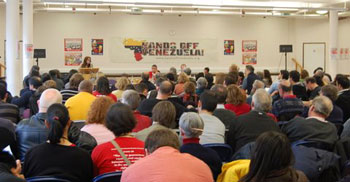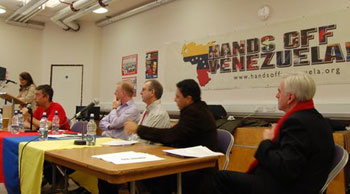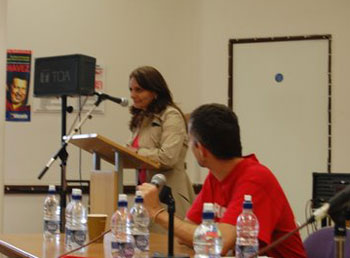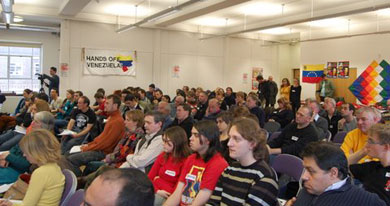Hands off Venezuela National Conference 2007 a great success!
- 26 November 2007
 On Saturday November 24th,
around two hundred people attended the third national Hands Off Venezuela
conference in Britain. A new steering committee was elected and resolutions
were passed in defence of the Bolivarian Revolution in the run-up to the
referendum on constitutional reform, on the environment and on the need for
joint work with other Latin American solidarity campaigns.
On Saturday November 24th,
around two hundred people attended the third national Hands Off Venezuela
conference in Britain. A new steering committee was elected and resolutions
were passed in defence of the Bolivarian Revolution in the run-up to the
referendum on constitutional reform, on the environment and on the need for
joint work with other Latin American solidarity campaigns.
Rob Sewell, member of the national Steering Committee, opened the conference, highlighting how the campaign has made significant progress in Britain and how even more support has been established amongst the students and the trade unions. Rob said that it was clear that the Bolivarian Revolution has great relevance for British workers too as it can serve as a great inspiration and lead to the awareness that changing society is possible.
He also mentioned how, the previous week, Tory mayoral candidate Boris Johnson pressed Kim Howells, the Foreign Office minister who is responsible for Latin America, about corruption in Venezuela. Shamefully, Dr Howells replied that "Venezuela was ranked 162 of a total of 179 in the Transparency International corruption perception index for 2007, down from 138th place in 2006."
Transparency International were also quoted in the disgraceful BBC This World documentary "The Trillion Dollar Revolutionary," presented by journalist John Sweeney, to smear Venezuela as the second-most corrupt country in Latin America. However, as Ambassador Samuel Moncada later pointed out, this group has no credibility when it comes to Venezuela. Conference also passed an amended resolution condemning the "biased and misleading" BBC programme.
First to speak was Derek
Wall, national spokesperson for the Green Party. As a committed
environmentalist, Derek said he was very impressed with the Bolivarian
revolution's green credentials. In fact, he said, he was proud that his only
transatlantic flight to date was to the World Social Forum in Venezuela last
year! He also pointed out that "Chavez is being attacked not for what he's doing wrong, but what he's doing right" and declared that "we need to inject a bit of Chavismo into British politics."
 Next to speak was Venezuela's
new ambassador to the UK Samuel Moncada, who gave a very stirring speech in
defence of the Bolivarian process and thanked HOV for our continued support. He
particularly stressed the dubious nature of Transparency
International, which has ranked Venezuela the 2nd most corrupt
country in the Americas. The board of Transparency International Venezuela, Mr
Moncada pointed out, contains coup-plotters who were signatories to the
notorious Carmona decree in April 2002.
Next to speak was Venezuela's
new ambassador to the UK Samuel Moncada, who gave a very stirring speech in
defence of the Bolivarian process and thanked HOV for our continued support. He
particularly stressed the dubious nature of Transparency
International, which has ranked Venezuela the 2nd most corrupt
country in the Americas. The board of Transparency International Venezuela, Mr
Moncada pointed out, contains coup-plotters who were signatories to the
notorious Carmona decree in April 2002.
Also speaking in the morning session was FBU General Secretary Matt Wrack who had the crowd cheering when he pointed out the hypocrisy of the British government accusing Venezuela of corruption. "I think that we need to look a bit closer to home," he said, recounting the details of the recent privatisation of Ministry of Defence research division QinetiQ, which saw senior managers pocketing 20,000 per cent profits.
John McDonnell MP spoke about the needs for cooperation and coordination between the different solidarity campaigns. He said the situation where HOV organises a meeting at a conference and then other campaigns organise meetings on the same day at the exact same time cannot continue. This was the reason behind his joint letter (with NUJ General Secretary Jeremy Dear) to the leaders of the trade unions who have backed HOV calling for them to organise a meeting to ensure these kinds of clashes become a thing of the past. He also demanded that the Brown government "makes a choice between democracy or oligarchy," slamming new Labour's diplomatic policy of hostility toward the Venezuelan government. He pledged to make solidarity with the Bolivarian revolution an issue that "no MP would be allowed to dodge."
 Alan Woods spoke about
Socialism of the 21st century, and how this demonstrated that "the
end of history" and the seemingly lack of opposition to the capitalism of the
West was incorrect, and being proved so in Venezuela. Alan made the point that
‘Socialism of the 21st century' was not a clearly defined term and
because of this there was the danger of confusion in the revolution. There is
the case of Baduel, a General who opposed the 2002 coup, but had now joined the
opposition, and academics such as Heinz Dieterich who are wrapping capitalist
ideas in a socialist rhetoric. Alan said that to build socialism you have to
nationalise the principal sectors of the economy, as "you cannot plan for what
you do not control, and you cannot control what you do not own".
Alan Woods spoke about
Socialism of the 21st century, and how this demonstrated that "the
end of history" and the seemingly lack of opposition to the capitalism of the
West was incorrect, and being proved so in Venezuela. Alan made the point that
‘Socialism of the 21st century' was not a clearly defined term and
because of this there was the danger of confusion in the revolution. There is
the case of Baduel, a General who opposed the 2002 coup, but had now joined the
opposition, and academics such as Heinz Dieterich who are wrapping capitalist
ideas in a socialist rhetoric. Alan said that to build socialism you have to
nationalise the principal sectors of the economy, as "you cannot plan for what
you do not control, and you cannot control what you do not own".
Caracas community activist Guadalupe Rodrigez thanked conference delegates for their support and stressed that it is "important that we don't feel like we're on our own" in Venezuela, before describing how her community was occupying a police station that had been notorious for torture and murder. She also stressed the leading role played by women in the Bolivarian revolution.
In the afternoon session, five resolutions were passed on topics ranging from cooperation in the solidarity movement, the HOV magazine to the environment. A lively debate ensued and amendments were added to several of the resolutions. These resolutions can be seen at the end of this article.
 The afternoon session
featured workshops on Socialism of the 21st century, the media in
Venezuela, workers' control and constitutional reform. All the workshops
featured some very lively debate and participants were left feeling enthused
and energised about the whole revolutionary process.
The afternoon session
featured workshops on Socialism of the 21st century, the media in
Venezuela, workers' control and constitutional reform. All the workshops
featured some very lively debate and participants were left feeling enthused
and energised about the whole revolutionary process.
The final plenary session featured contributions from CWU Deputy General Secretary Tony Kearns and Nelson Rodriguez. Tony Kearns made the point that in Chile and elsewhere in Latin America solidarity campaigns had only been active once the movement there had been defeated by imperialism. Venezuela is one of the few places in the world where there is something positive happening, so it is crucial to build solidarity with it now. Nelson gave a very inspiring speech about Inveval and the experience of workers' control there. He explained how the top decision making body was the general assembly of workers, and workers elected to deal with particular aspects of management, finance, technical, services etc. were accountable to this body and could be recalled at any time. Those elected continue to receive the same wages as all the other workers. Delegates from Inveval also participate in the local communal councils as well as battalions of the PSUV.
The conference was closed by NUJ General Secretary Jeremy Dear, who although unwell, said that the only thing that would inspire him to get up and out was the Bolivarian Revolution! Jeremy announced the launch of a new "mediawatch" group that would span the English-speaking world and declared his determination to "mobilise the international labour movement in support of the Bolivarian revolution."
The whole day was a great success and left everyone inspired to carry on the struggle to defend the Venezuelan people and their Bolivarian revolution.
Resolutions (unamended):
RESOLUTIONS FOR HANDS OFF VENEZUELA NATIONAL CONFERENCE
NOVEMBER 24th 2007
1. Solidarity Co-ordination
Conference supports the broadest possible solidarity work in defence of Venezuela's Bolivarian revolution;
and, in furtherance of this aim, supports the initiative of John McDonnell and Jeremy Dear to convene a meeting between the solidarity groups and trade union affiliates to explore how solidarity work can be co-ordinated more effectively.
proposed by the National Steering Committee
2. Trade Union Solidarity
Conference recognises the successful record of Hands Off Venezuela in bringing the news of the Bolivarian revolution to the trade union movement, having intervened in all the main trade unions over the last four years and, as a result, helped to get motions on Venezuela passed at the TUC;
recognises, given the crucial stage that the Bolivarian revolution is currently at, the need to step up solidarity work in the trade unions;
and, in order to plan an effective intervention in next year's conferences, supports the organisation of a trade union seminar in the House of Commons in early 2008 to which all trade union supporters will be invited.
proposed by the National Steering Committee
3. Constitutional Reform
Conference notes that, on December 2nd, Venezuelans will vote in a referendum on the reform of the Bolivarian constitution;
also notes that the stated aim of the 69 amendments is to "build Venezuelan socialism as the only road towards the redemption of our people, the salvation of our country and the building of a new world";
further notes that, as a response to this process of reform, there has been a renewed campaign against the Bolivarian revolution on the part of the oligarchy and imperialism, including economic sabotage, violence in the streets and university campuses and a campaign in the national and international media of lies and distortions regarding the actual content of the proposed constitutional reform;
and reaffirms its support for the Bolivarian revolution, which has been democratically ratified by the overwhelming majority of Venezuelans on numerous occasions, and urges all members of Hands Off Venezuela to commit themselves to stepping up the solidarity work, to respond to the media lies and to lobby their MPs to sign Early Day Motion 286, which was tabled by campaign joint-president John McDonnell and which deals specifically with these issues.
proposed by Jorge Martin
4. Magazine
Conference welcomes the publication of the latest Hands Off Venezuela magazine;
regards the magazine as a vital tool for reaching potential supporters who either don't have access to the internet or who haven't yet heard about the revolutionary process in Venezuela;
believes that members of Hands Off Venezuela should each be mailed a copy of the magazine for free;
and resolves to increase the number of magazines published each year.
proposed by Charley Allan
5. Venezuela and the Environment
Conference notes that the previous model of economic development in Venezuela has resulted in severe ecological degradation in many parts of the country;
also notes that it is the country's working class and poor who have been most adversely affected by this disregard for environmental considerations which the race for profits has created;
further notes: (1) the plan by the Environment and Natural Resource Ministry to reduce the air pollution levels in Caracas by 80 percent in 2007, with the goal of being pollution free by 2010, (2) the improved protection of waterways and fishing areas, especially those affected by oil exploration and drilling, (3) the protection of unique ecological areas and indigenous lands, such as the 3.6 million-hectare Imataca Forest Reserve, (4) the assistance given to thousands of coffee-growing families in the Andes region to establish environmentally sustainable organic coffee and vegetable co-operatives, (5) the banning of the cultivation of genetically engineered crops on Venezuelan soil and the establishment of a large seed bank to maintain indigenous seeds for peasant movements around the world;
agrees to show our full support for such important developments by trying to disseminate information about the revolution's commitment to Venezuela's environment in our publications;
expresses its concern that a few large mining and energy projects - such as the opening of further coal concessions in the Sierra Perija and the plan for a gas pipeline through the Amazon basin to Argentina - appear to repeat the old pattern of disregard for the environment and have brought opposition from indigenous groups and environmentalists in Venezuela and other countries of Latin America;
therefore urges the Bolivarian government to submit all such development plans to the strictest environmental and socio-ecological standards and to direct democratic control by the communities concerned.
proposed by Liam McQuade

 Please help build the campaign by
Please help build the campaign by